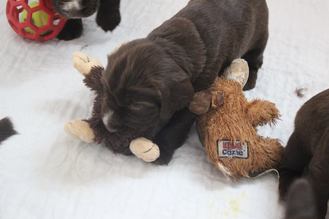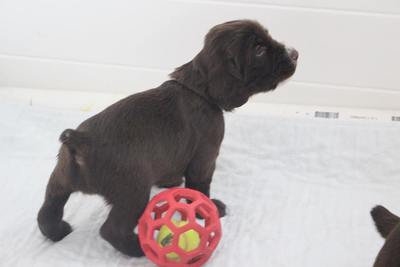Puppies

The joy and excitement of bringing home a new family member is one of the most amazing feelings in the world. Before you get to that point however, there is a lot of work behind the scenes. Here's a little glimpse into how are puppies are raised, as well as, some frequently asked questions! (Please do not hesitate to reach out if you have questions that aren't answered here)!
Our dogs live in our home as part of our family. Family, first. ALWAYS. Showing, performance, and all that jazz comes secondary. Our puppies, like our adult dogs, are also raised in our home as part of our family. They are exposed to the everyday life of a household from the sounds of vacuum cleaners and dishwashers, to the sounds of kids playing during puppy parties, chickens crowing outside, cats coming by to say hello, visits to the feed store, and running around on over 3.5 acres of fenced in field. While the puppies are with us they are exposed to crates for crate training, riding in the car in their crates, nail clippings, general grooming/clipping, noise, sights, sounds, and the like. We want to ensure that a puppy already in a new home and away from their siblings are not exposed to these unusual things for a first time, especially during a developmental fear stage, so we give them this important exposure while they are with us. We do our best to provide as many positive experiences for them as possible.
Prior to this basic socialization and exposure to "life" we work with them during the perinatal period and practice what is known as the BioSensor program on all of our litters at an early age. This program is simple daily exercises performed with the puppies in their first 2 weeks. Research has shown that these exercises can vastly improve a puppies neurological system during this early time period by exposing them to different simple stimulation/stressors.
Our dogs live in our home as part of our family. Family, first. ALWAYS. Showing, performance, and all that jazz comes secondary. Our puppies, like our adult dogs, are also raised in our home as part of our family. They are exposed to the everyday life of a household from the sounds of vacuum cleaners and dishwashers, to the sounds of kids playing during puppy parties, chickens crowing outside, cats coming by to say hello, visits to the feed store, and running around on over 3.5 acres of fenced in field. While the puppies are with us they are exposed to crates for crate training, riding in the car in their crates, nail clippings, general grooming/clipping, noise, sights, sounds, and the like. We want to ensure that a puppy already in a new home and away from their siblings are not exposed to these unusual things for a first time, especially during a developmental fear stage, so we give them this important exposure while they are with us. We do our best to provide as many positive experiences for them as possible.
Prior to this basic socialization and exposure to "life" we work with them during the perinatal period and practice what is known as the BioSensor program on all of our litters at an early age. This program is simple daily exercises performed with the puppies in their first 2 weeks. Research has shown that these exercises can vastly improve a puppies neurological system during this early time period by exposing them to different simple stimulation/stressors.
|
Before going home all of our puppies are registered with the AKC, have a health guarantee, are microchipped, dewormed, eyes certified clear of disease by a canine opthamologist, hearts certified by a canine cardiologist, vaccinations, and a final wellness check/guarantee by a veterinarian before leaving for their new family. Each puppy goes home with its own package of information to include basic puppy care, as well as, a copy of the puppy contract, helpful articles on the breed, training tips, pedigree, microchip registration info, a few new toys and treats, and a blanket that smells like their mom.
Our goal as ethical breeders is to find the best possible puppy for each home and vice versa. We match puppies based on personalities and information about your lifestyle and needs that we gather along the way. We want to make sure each puppy has the absolute best chance of succeeding in their forever home! |
We recommend reading Dr Ian Dunbar's "Before You Get Your Puppy" - before bringing your new addition home.
|
Frequently Asked Questions
What is the difference between pet quality and show quality?
Show quality puppies are the ones that show promise to closely match the breed standard. Pet quality puppies usually have a fault that most people will never notice. Faults could be that they are small boned, incorrect head piece, tail set too high, long hocks or may have a personality not suited for the show ring. Although a puppy may be labeled as pet quality this does not make the puppy any lesser quality than another. It simply means they are not suited for the show ring, nor should they be bred.
Why do I have to pay a deposit?
This is to ensure that I know you are seriously interested in a puppy. Breeders spend hundreds of hours building relationships with their buyers and there is nothing more disappointing than when someone falls off the face of the earth and drops all contact. This wastes time in finding an ideal home for the puppy you were being matched with.
I want pick puppy. Why won't the breeder tell me if I can have the pick of the litter?
First of all there is really no “pick of the litter”. Why? Your expectations of what you want your puppy to do may be different than another person. If a person is looking for a performance dog they will want the puppy that is out going and high energy. That same puppy would be a bad fit for a person who never had a dog before and is looking for a pet. The puppy with excellent show structure may not show an interest in birds, so a person looking for a hunting dog wouldn’t want that particular puppy. This is why it is important to express to the breeder what you want your puppy for and be honest about lifestyle, wants and needs, as we choose which dog would best suit you, and you them.
I am on a waiting list and the puppies are now 6 weeks old. I still haven't been told when I can pick my puppy or if there is even one for me. Why can’t you just tell me now?
As we talked about briefly above, we want the best fit for your family and for our puppies. Their wellbeing is always foremost in our mind. For this reason, we (as well as most breeders) do temperament testing and structural evaluations on the puppies at 8-10 weeks of age. Prior to this age the puppies are too young to complete a full assessment. Since the evaluations aren’t completed until 8-10 weeks the breeder may not know for sure if they have a puppy that will be right for you. This is especially true for people that are looking for show, performance, or hunting dogs.
How much does a Field Spaniel puppy cost?
The average cost of a Field Spaniel puppy is between $2,000-$4,000. There is usually no price break between pet, show & performance dogs as being labeled as one or the other does not increase nor decrease the quality of the puppy. In many instances a dog that is suitable for the show ring is placed in a non-show home simply because a show home could not be found. While initially the price of a Field Spaniel puppy may seem high, this price range is no higher then other rare breed pure bred dogs & in many instances it is lower. Invariably when these prices come up, the argument is made that breeders are only in it for the money. This argument couldn't be further from the truth. It is VERY expensive to raise litters the right way. There is health testing involved, supplies, registration, vaccinations, time (we are literally with the puppies the first 2 weeks full time, even more so if the puppies are struggling). It gets even more expensive if things go wrong and a puppy gets sick or mom needs a c-section. Very rarely do hobby breeders break even over time. This is a passion; we breed to continue the breed and continue to improve it.
My AKC papers say limited registration. What does that mean?
It means that your dog may participate in AKC performance event but may not be shown. Limited registration is usually placed on pet puppies. Pet puppies are generally sold on spay/neutered contracts. Also, with limited registration it means that if your dog has puppies they can’t be registered.
Everyone says to be sure that the puppies’ parents have health clearances. What are the different health clearances?
Health clearances are tests that are conducted by a veterinarian to check whether a dog has any health issues (both hereditary and non-hereditary). These checks are needed so that breeder can make an informed decision when breeding animals. It is important as although we can’t prevent all health issues such as hip dysplasia and thyroid disease, breeders can reduce the probability of it happening by checking the breeding stock.
The breeder states that they have health clearances. I looked on the OFA and CERF website and could not find any listing for the dogs. What does this mean?
If a breeder is advertising or stating they have health clearances they should be able to provide the paperwork/certificates to back up any claims they make. OFA and CERF have an open data base that allows you to see results of tests if the breeder chooses to release the results. Some breeder choose not to release the results when a dog does not pass. Even if results are not listed, if the test was done the breeder or stud dog owner should have paperwork showing the results.
What is a CHIC number?
CHIC stands for canine health information center. The Field Spaniel Society of America made recommendations as to which health issues are more frequently seen within the field spaniel breed. The breed requirement for a CHIC number includes hips, eyes and thyroid. Recommended tests that are optional include elbows, cardiac and patella. Please note that a dog needs not to pass each of the tests. The CHIC number means the breeder has taken the time to have the tests performed so that informed decisions can be made prior to breeding an animal.
The parents are both AKC champions. So the puppies will be healthy and outstanding dogs. Right?
A championship simply means that the dog has met the requirement by earning the 15 points to receive its championship. It DOES NOT guarantee the health of the parents nor their puppies. It DOES NOT guarantee that your puppy will be a champion. It doesn't ensure that the puppy will have an outstanding temperament or be trainable.
What is the most important thing I can do to find the right breeder and Field Spaniel puppy?
Do. Your. Research! Gather information about the breed, ask direct questions to the breeder. Example: “Does your dog have a thyroid problem?” which is different from “Have you had a thyroid test done on your dog?” Get specific. Some of my own dogs have health concerns that I am very open about. If a breeder shuts you down, refuses to answers or answers in a round about way, seek out more information. Research the answers you receive, look at different databases, compare what you've been told to what you see. I also suggest talking with multiple breeders and get different viewpoints. This doesn't meant they should trash other breeders’ dogs or gossip, but give you an honest opinion about what their questions, concerns, comments would be in different situations. Getting a Field Spaniel (or any dog) is a huge investment, as you have them for their entire life, so it is VERY important that you make an informed decision.
When should I spay or neuter my Field Spaniel?
This is a very touchy subject, one with which I will share my opinion and why. HOWEVER, I strongly urge you to do your research. Don't just listen to me, or you veterinarian, or your neighbor. Seek out information and make an informed decision. Personally, I will not spay or neuter a dog before the age of two years old, unless their is medical reason necessitating the procedure. There have been studies on the effects of early spay/neuter on dogs and there is plenty or scientific reading material out there for you to form your own opinion. My personal opinion is also based on personal experience with other breeds, which included cruciate tears and cancer.
Here's a couple of articles to get you started;
http://www.akcchf.org/news-events/news/health-implications-in-early.html
https://breedingbetterdogs.com/article/early-spayneuter



